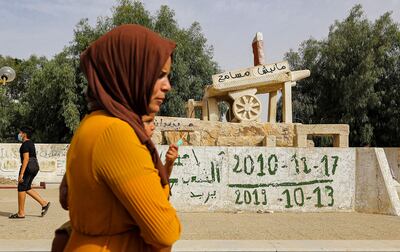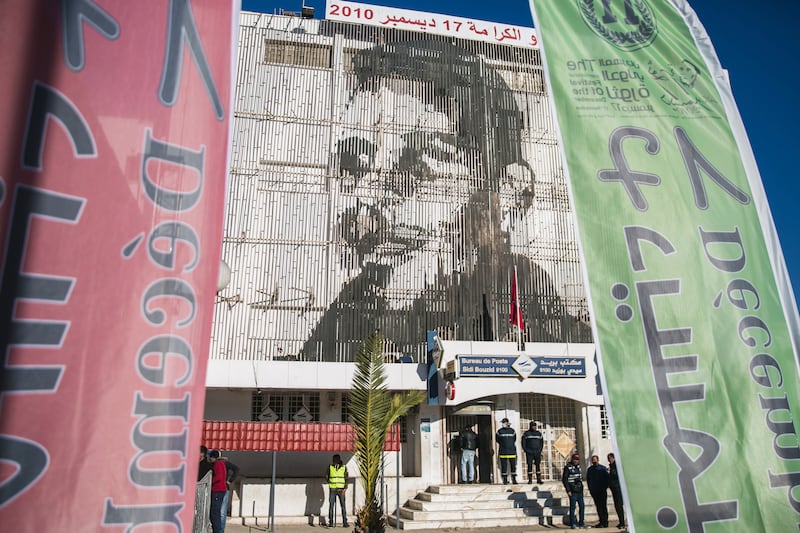It has been 13 years since Tunisians took to the streets to call for “employment, freedom and national dignity,” a slogan that echoed throughout the country from its north to its south.
On December 17, 2011, a street merchant named Mohamed Bouazizi set himself on fire after authorities in Sidi Bouzid attempted to confiscate his cart.
Few could have imagined that Mr Bouazizi's act would begin shaping not only Tunisia’s future but also North Africa and the wider Middle East.
After weeks of protests in the interior of the country, the uprising eventually reached the capital Tunis on January 14, when thousands of people gathered at Habib Bourguiba Avenue in front of the headquarters of the Ministry of Interior.
For the first time in 23 years, Tunisians chanted in one voice “Dégage! Dégage!” [leave] calling on then-president Zine El Abidine Ben Ali to quit.
That moment ushered in another phase in the North African country’s history and led to Mr Ben Ali’s escape.
Television channels broadcast live the moment his plane took off from the Tunis Carthage Airport’s runway on a flight to Saudi Arabia.

“We rejoiced, we could not believe it. Everyone just went to the street and started screaming and crying,” Alala Mhamdi, 59, told The National inside his grocery store in the neighbourhood of Dar Fadhal, 11km north of Tunis.
Today, Mr Mhamdi, who remembers the uprising with great pride and feels thankful for the freedom it gave Tunisians, expressed disappointment in the political class that has led the country since 2011.
“The revolution freed us from the prison that Ben Ali kept us in. It is not [the revolution's] fault, it is the fault of those that ran the country afterwards,” Mr Mhamdi said.
“If those who took power kept their word, we would not have not reached this point.”
For Mahdi Ben Khalifa, 43, the uprising was not something to celebrate in the first place. His opinion became even stronger as years went by after 2011.
“Before, two dinars could buy you a piece of bread, a tuna can and a harissa can, which is a good enough meal. Today, two dinars would not even buy you a harissa can,” Mr Ben Khalifa said as he shopped in his neighbour Mr Mhamdi’s store.
Mr Ben Khalifa, who previously considered himself middle class, said that today both he and his wife need to make at least 4,000 dinars ($1,293) a month to make ends meet, an amount that is impossible for them to acquire at the moment, even if they work day and night.
“There is no middle class any more, we are all barely sitting above the poverty line,” he said.
Tunisia’s current minimum wage remains as low as almost $150, compared to an ever-increasing living cost and a stagnating economy.
Mr Ben Khalifa said the political regime after 2011 was the main reason that the country continues to suffer economic stagnation. However, he also believes that his fellow Tunisians have contributed to the current situation.
“Look at the coffee shops, it’s all filled with young people sitting all day long drinking coffee and smoking cigarettes without doing anything,” he told The National.
Mr Ben Khalifa believes that there are jobs available in the country, but the people’s absence and the lack of work ethic made things worse for everyone.
According to its National Statistics Institute, Tunisia has registered a 15.8 per cent unemployment rate in the third quarter of 2023, with the highest rate in the marginalised interior governorates where the 2011 uprising began.
According to the IMF, that represents a similar economic malaise to the years before 2011, when unemployment rates for graduates averaged 15 per cent.
Injustice continues to suffocate Tunisian families
In the narrow alleyways of Dar Fadhal, one cannot help but feel and see the exhaustion on the faces of men and women.
People walk into grocery, vegetable and poultry stores just to look at the high prices of food.
Some either walk out empty-handed, others barely fill in their shopping carts with a small amount of vegetables, maybe a couple of apples and if they are well off enough that day two pieces of chicken breast.
Plumber Youssef Ben Hassine, 64, was walking by when he heard Mr Ben Khalifa and Mr Mhamdi talking and wanted to also share his feelings.
“You want to know what the mundane citizen feels? We feel injustice, oppression, tyranny and helplessness as we continue to grow old,” he said.
Mr Ben Hassine has three adult children who, he says, struggle to keep a job because of the injustice inflicted upon them by employers.
“They [employers] expect them [his children] to shut their mouths and accept working like animals just to get paid 450 dinars ($145) per month,” he said.
“In every neighbourhood, you can find at least 1,000 unemployed youth and all they can think of is leaving this country on the first boat to Europe,” Mr Ben Hassine also expressed his sadness at what Tunisian youth are going through.
According to the UN Migration Agency IOM, more than 25,500 Tunisians left by boat in the aftermath of the fall of the Ben Ali regime, a number that is increasing every year.
In 2024, opinions vary as Tunisia goes back to the presidential system that existed before the uprising after President Kais Saied consolidated powers in 2021.
While some believe Mr Saied’s current rule is finally ending the failure that has overwhelmed governments for more than 10 years, others are not as hopeful that he will be different to his predecessors.
“He might be an honest man, but being honest is not enough. Things will not just resolve with politics, [the problem] is bigger than that,” he said.







